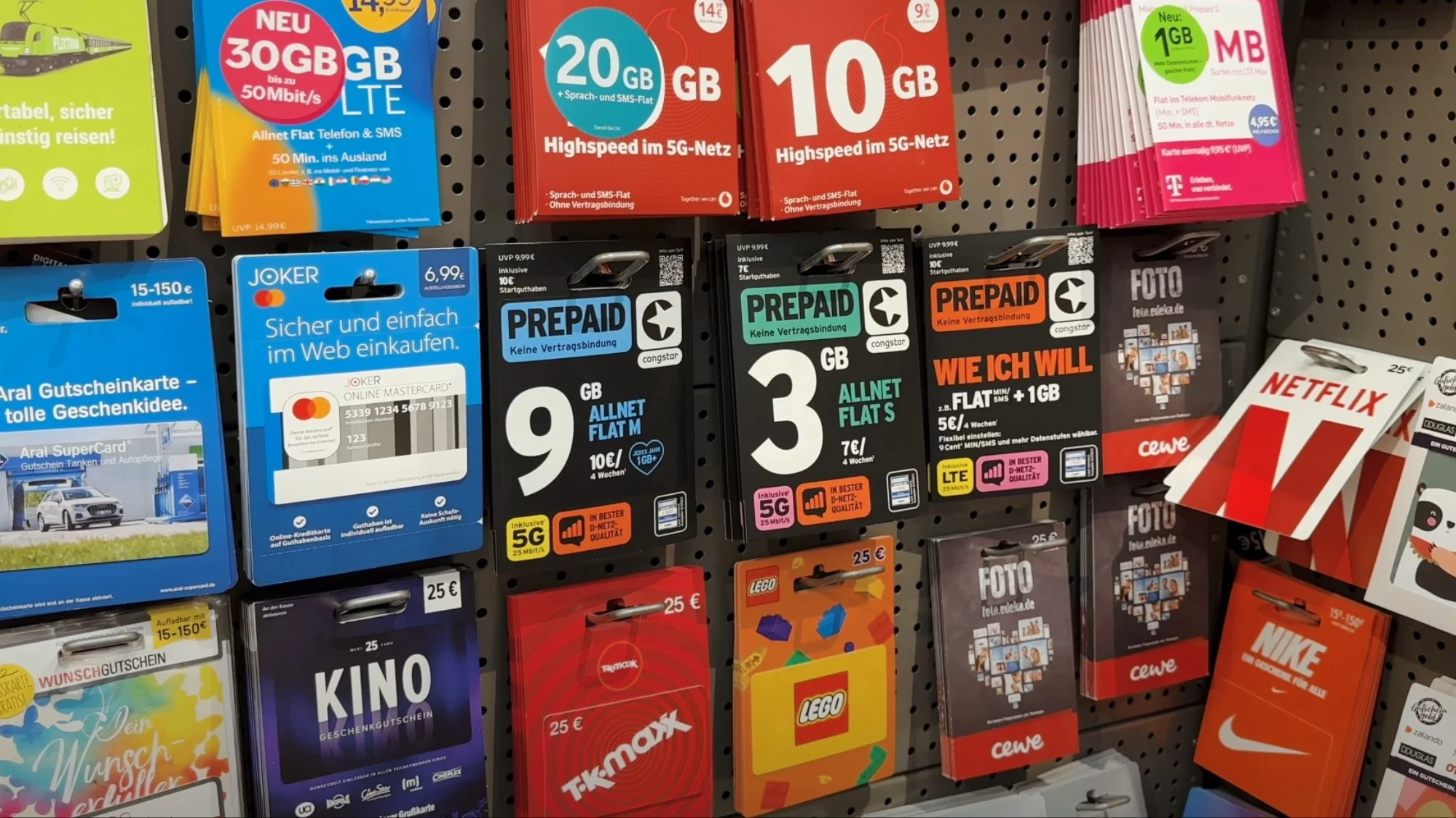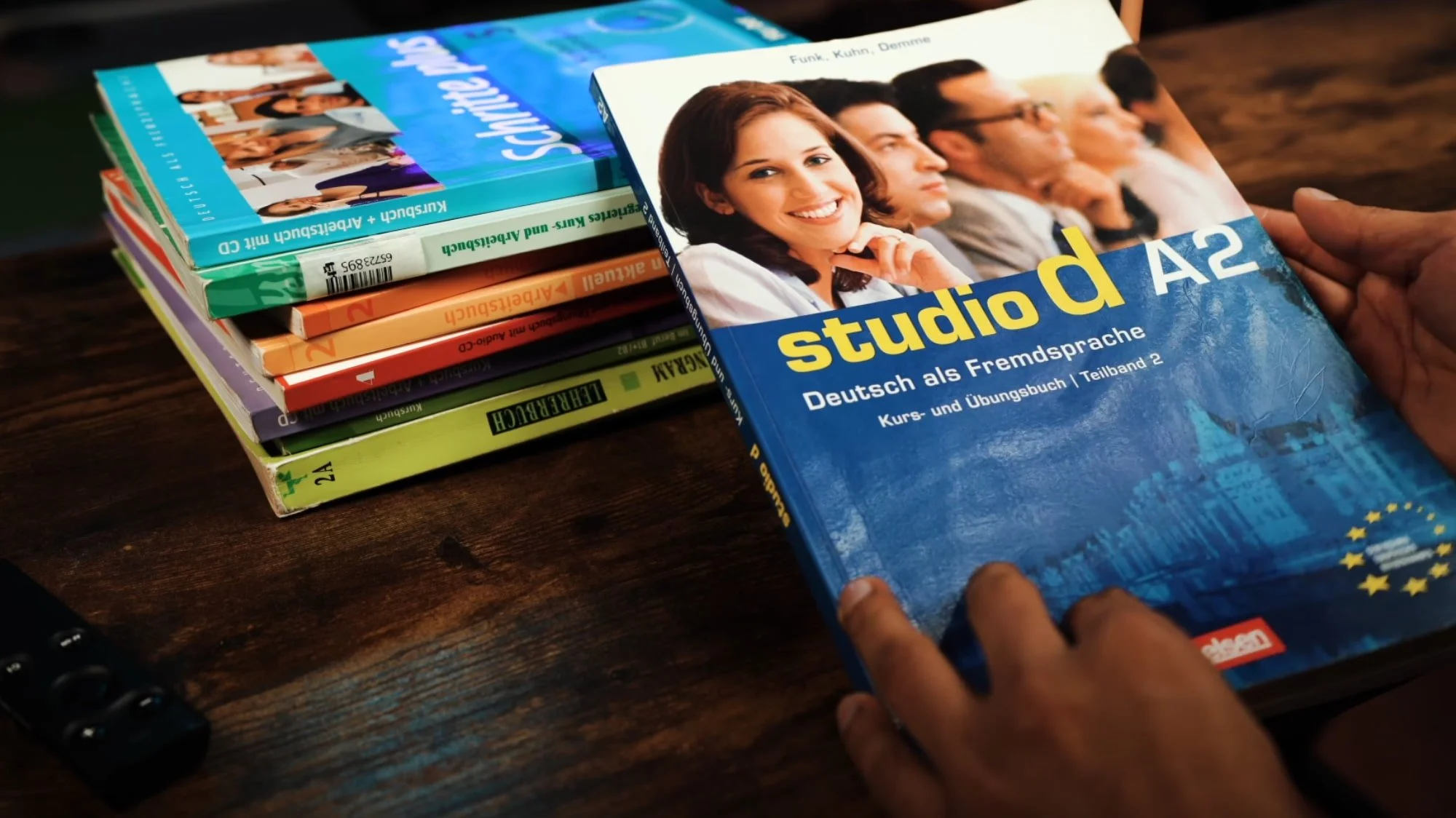Just Landed in Germany? Do These 10 Things First!
Germany is not for beginners. The language, the weather, the bureaucracy, it can all hit you at once. So the first few days after you arrive here, it can feel a bit overwhelming. But only for those who aren't prepared.
So in this article, I’m going to explain in detail what are the important things you need to do right after landing in Germany. Step by step. So that once you’re here, life becomes a little easier, and a lot less confusing.
1. SIM Card
Getting a SIM card is that one step, making every additional step easier. You can grab one from supermarkets such as Aldi or Lidl or Electronic Stores such as Saturn or MediaMarkt, or you can even order it online. And preferably get a prepaid SIM card. They’re cheap, easy to activate, and enough to get you going. And once you are settled, you can consider switching to something permanent like a mobile contract. That will give you better rates, unlimited calls, and more data.
But the next step is kind of the most important one. Maybe more important than getting a SIM.
2. Accommodation
If you’ve already arranged housing before landing in Germany, great. You’re off to a good start. But if you’ve only booked a hotel or a hostel, or you’re crashing at a friend’s place for the time being, then your top priority should be to find something permanent. Because without a proper address, you can’t do basically anything.
Now, I’ll be hones, finding accommodation in Germany isn’t easy. Especially in major cities like Berlin, Munich, and Frankfurt.
But with some effort, a bit of patience, and the right networking, you can find something. And two platforms that can help you in your search are WG-Gesucht and ImmoScout24.
But if you’re on a tight budget, be ready to make compromises. Either find a place a bit outside the city center or, be willing to share a flat with others.
3. Anmeldung
Once you have an address the next important thing to do is Anmeldung or city registration. This is mandatory and you’ve got two weeks from the day you move in to get it done. You can do this at the Bürgeramt, which is the city’s registration office.
These places could be super busy based on your location. So it would be better to make an appointment online or show up super early in the morning to try and grab a slot.
For the appointment, you’ll usually need to carry your:
Passport
Filled-out registration form
But if you’re renting a place, then there are a couple more documents you need to take with you:
Rental contract
Wohnungsgeberbestätigung— which is kind of a written confirmation from your landlord that says, “Yep, this person lives here now.”
Anmeldung is the one step that unlocks pretty much everything else, your residence permit, your bank account, health insurance, etc. So do it soon and do it right.
4. Open a Bank Account
For paying rent, getting your salary, or just buying things online, you will need one bank account.
You’ve got a few options:
Traditional bank like Deutsche Bank or Commerzbank with physical branches.
Online banks such as Revolut, N26, or C24.
Online banks are newer, cheaper, and more convenient. Just go to the official website, fill out the online application form, and then submit copies of your passport, Anmeldung, and probably your visa.
5. Health Insurance
Once you’ve sorted your Anmeldung and bank account, the next thing on your list should be health insurance.
Whether you are in Germany for studies, job search or work, you have to be insured. It’s the law. If you’re already in Germany on a study or job search visa, chances are you already have insurance when you applied. But you still need to activate it after arriving. And if you want to stay longer, you may have to switch to a local health insurance provider.
In Germany, there are basically two types of health insurance schemes you can pick from.
Public Health Insurance, or Gesetzliche Krankenversicherung is what most people go for. It's simple, covers you and your family, and is accepted everywhere.
Private Health Insurance or Private Krankenversicherung. This is for specific cases — like if you’re self-employed, or earning over a certain limit. It does give you more benefits, but it could be more expensive and a bit complicated.
While we’re talking about insurance, I would highly recommend getting private liability insurance, or Haftpflichtversicherung. This one’s not mandatory, but it can easily become a lifesaver.
For example, if you accidentally damage someone’s property, like breaking your landlord’s window or knocking over someone’s bike, you’re legally responsible for the damages, and the costs can be crazy. And this insurance covers you, and it’s not that expensive to get one.
6. Residence Permit
Most people come to Germany with a short-term visa, which is valid for about 3 to 6 months. But if you’re planning to stay longer you’ll need to convert that visa into a residence permit or in German, Aufenthaltserlaubnis. This allows you to legally stay in Germany beyond that initial visa period.
You can apply for this at the Ausländerbehörde, or the Foreigners’ Office in your city. Just type “Ausländerbehörde + your city name” into Google and the official site will show up.
From there, you can usually download the application form and also book an appointment.
For the appointment, you will need to take with you:
Passport
A copy of your visa.
Filled-out application form.
Biometric passport photos.
Health insurance.
Proof of financial resources such as a blocked account.
Rental agreement.
Anmeldung certificate.
Application fee.
Once you apply, it would take about 2 to 4 weeks to get the permit in your hand, but the exact duration depends on the location you are applying from.
7. Transportation
Once you’re done with all the mandatory things, there is something just as important, getting around in Germany efficiently and in a cost-effective way. Now, there are different ways people usually travel around here.
First up, public transport.
If you’re in a city or even a medium-sized town, this is going to be your best option. You’ve got trains, trams, buses, and they’re all super reliable. Just get a monthly or yearly pass and you’ll end up saving quite a bit over time.
If you prefer driving, you can get a used car for a reasonable price.
But know that, it’s not as simple as just buying the car. There’s also the cost associated with the registration, insurance, and regular inspections. You may have to switch to a German driving license since your current one might not be valid forever in Germany.
If you’re looking for the cheapest and most convenient option, just get a bicycle. Most cities in Germany are super bike-friendly with dedicated bike lanes and proper parking spots. It's a great way to commute and explore new places for free.
8. Taxes
Let’s talk about the least exciting topic, taxes. If you’re planning to work part-time or full-time in Germany, this is something you really need to understand. Germany has a progressive tax system and when you do your Anmeldung, you’ll automatically get assigned a tax ID or Steuer ID.
Then later you will be taxed based on your income and which tax class you fall into. And every year, you may have to do the annual tax return or Steuererklärung and in some cases, you may even get a nice little refund. Especially if you had job-related expenses.
I’ll be honest, the German tax system is confusing. Even locals get confused. So if it’s your first time, it might be a good idea to get help from a tax advisor or Steuerberater. Or at least use a platform that guides you through the process in English.
9. Learning German
Learning German can make your life easier in Germany.
You can survive with English, especially in bigger cities, or if you’re working in an international company. But if you really want to feel settled here, make local friends, or improve your career chances, learning German is a must. You can do language courses at local community colleges called Volkshochschulen or at private language schools. If you prefer learning at your own pace and on your own time, you can also start with apps like Duolingo or Babbel.
But I would suggest to attend a language course. You will learn German faster and you can also make some new friends.
10. Cultural Integration
Last on the list, and maybe the most important if you want to feel at home in Germany, is to start integrating into German society. Making friends in Germany takes time. Germans are a bit more reserved in the beginning, but once you break the ice, you can make deep and long-lasting friendships. Start with the basics, introduce yourself to your neighbors, go to local festivals, check out street markets, join sports clubs or language exchanges — anything that gets you talking to people.
Moving to Germany or any foreign country for that matter is a big step. Just don’t expect to figure everything out on day one. Keep going, one step at a time. You’ve got this. Welcome to Germany.
Disclaimer: The Content is for informational purposes only, you should not construe any such information or other material as legal or other advice. It is important to do your own analysis before making any decision.


















